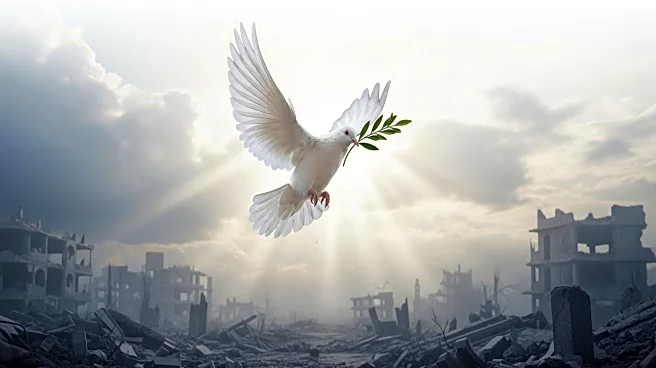What is the story about?
What's Happening?
Cindy McCain, Executive Director of the UN World Food Programme (WFP), is facing criticism from lawmakers and officials for failing to effectively distribute emergency food aid in Gaza. Accusations of incompetence have arisen due to the inability to coordinate with Israel's military and the Gaza Humanitarian Foundation (GHF), resulting in aid being looted by Hamas. Calls for McCain's resignation are mounting within Congress and the Trump administration. McCain was appointed by former President Joe Biden and approved by UN Secretary-General Antonio Guterres for a five-year term starting in 2023. Despite the WFP's significant budget, with US taxpayers contributing nearly $4.5 billion last year, aid deliveries in Gaza have been largely intercepted and diverted.
Why It's Important?
The criticism of Cindy McCain highlights significant challenges in international humanitarian aid distribution, particularly in conflict zones like Gaza. The failure to secure aid deliveries not only impacts the immediate needs of Palestinians but also potentially strengthens Hamas by allowing them to control and profit from diverted resources. This situation underscores the importance of effective coordination and transparency in humanitarian efforts, which are crucial for maintaining US national security interests and ensuring taxpayer money is used efficiently. The controversy also reflects broader issues within the UN's operational capabilities and the political dynamics influencing aid distribution.
What's Next?
Potential outcomes include increased pressure on McCain to resign, with discussions already underway about possible successors. The Trump administration may leverage humanitarian aid as a diplomatic tool to push for a cease-fire in Gaza. Additionally, there may be calls for greater oversight and reform within the WFP to prevent future mismanagement. The situation could also influence US foreign policy decisions regarding aid distribution and relations with Israel and Palestine.
Beyond the Headlines
The situation raises ethical questions about the militarization of humanitarian aid and the balance between security and effective aid delivery. It also highlights the complexities of operating in politically sensitive regions and the potential for aid to be used as a tool in geopolitical strategies. Long-term implications may include shifts in how international aid organizations approach security and collaboration with local entities.
















